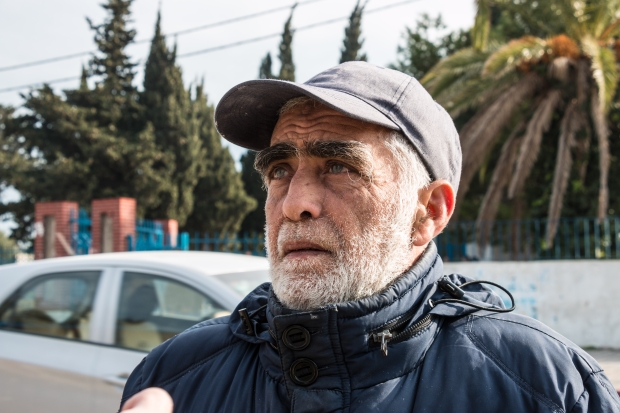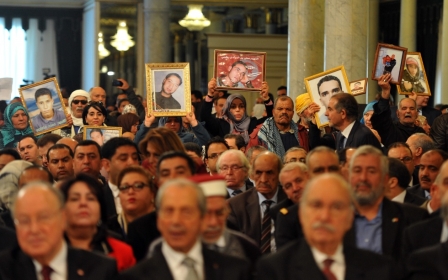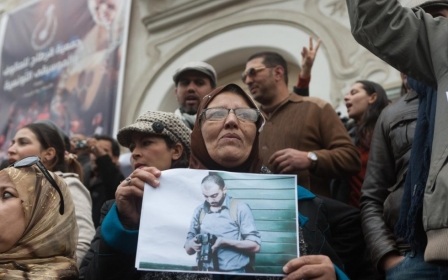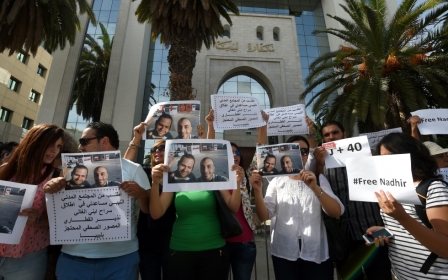Families of young Tunisians fighting with IS appeal to new president
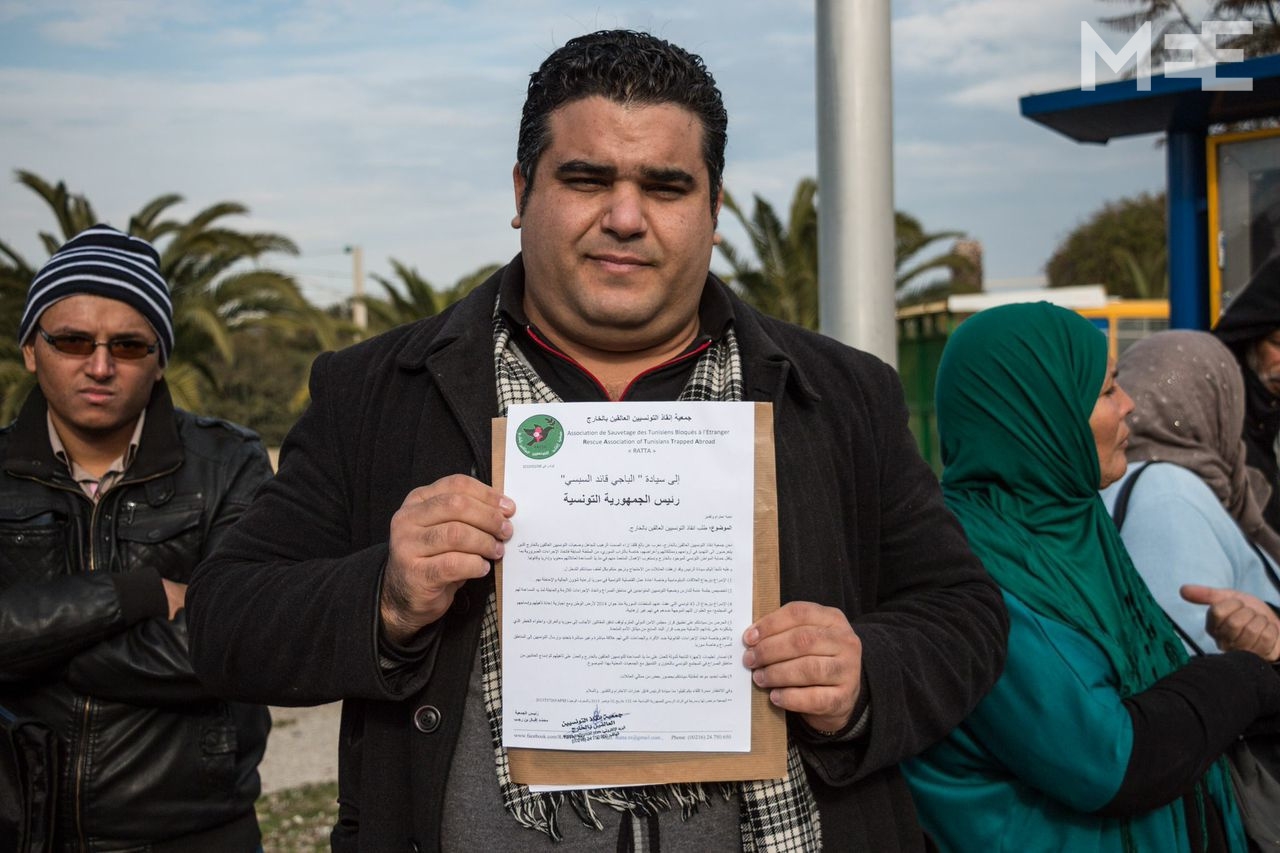
On New Year’s Eve, 2014, Mahfoudh El Balti, 54, sat slouched over his metal café table, rain tumbling from the eves outside. The sky was heavy and grey, and the air in the downtown Tunis café was chilly. Couples around him chattered loudly, sipping on coffee and beer.
“He was just a kid,” El Balti said of his son, 23. “His mind was still raw. Anything he heard, he believed.” El Balti, from a working-class neighborhood just north of Tunis, ran a hand over his neat white beard as he spoke, then rested his fingers on the rough spot on his forehead that touches the ground during prayer.
His son, who El Balti did not wish to name, left for Syria suddenly in late December 2012 after finishing post-secondary school vocational training. He is currently in the Islamic State-controlled city of Raqqa in Syria, according to El Balti, and calls his father from time to time.
Western media has portrayed those going to Syria or Iraq as a monolithic entity. Often relying on dubious information provided by the Interior Ministry or similar sources, these articles paint the youth to be a group of angry, radicalised young men intent on destroying the West and initiating a state based on extremely harsh Islamic law. While this may be the case with some, El Balti’s son does not fit this image.
Surprisingly, Tunisia, an Arab country praised by many for its high education rates and secular distance between governance and religion, has recently seen thousands of its young men head to Syria and Iraq as fighters - a report by the International Center of Radicalisation from 2014 estimating there may be as many as 3,000. Perhaps most notable is that per capita, Tunisia has one of the highest rates of such cases.
El Balti believes the polarised political environment since the 2011 revolution - with mainstream secularist facing off against political Islamists amid a cacophony of anti-terror rhetoric - is what influenced his son to leave for Syria. He claims that the marginalisation of moderate ulema’ - religious scholars - during the reign of former presidents Bourguiba and Ben Ali left a vacuum filled by extremist preachers.
“If we had ulema’ on TV who spoke directly from the Quran, with a wise interpretation, we wouldn’t have this problem,” he said solemnly.
Indeed, international observers note that the polarisation in Tunisian society over the last four years has contributed to instability and created an environment where all Islamists - no matter their ideological colour - may feel cornered. Tunisia has thus become an “an echo chamber for the deadly conflicts agitating the region,” according to an October 2014 report from the International Crisis Group.
The report noted that the messages disseminated by the Interior Ministry and much of the national media serve to divide and isolate Islamists, including moderates, even further. “Instead of focusing on the practical task of reducing border violence, [the Interior Ministry’s] discourse has promoted the prevailing atmosphere of insecurity. This indirectly encourages renewed polarisation over the debate on political Islam and fuels fears that the government may restrict civil liberties in the name of state security.”
El Balti asks of the political elites settling into their new positions after the December elections, “Will you continue to harm, or will you make things better?” As El Balti spoke, Béji Caïd Essebsi, an 88 year-old politician who served under both previous regimes, and leader of the secularist Nidaa Tounes party, was sworn in as president.
Imen Triki, a lawyer and director of the Organization of Freedom and Equity in Tunis, cited spoiled hopes for the revolution as the main reason for young Tunisians’ departure to Syria and Iraq. “We’ve had this revolution, which the youth made, but the youth are disappointed with the results,” she said.
The great majority of these young people are between 19 and 30 years old, says Triki, and very poor. “They’ve maybe studied until the age of ten. And they’re looking at internet sites spreading a very puritanical strain of [Wahhabi] Islam, and they’re influenced by it,” she added.
Add to that the newfound presence of Salafist preachers in marginalised neighborhoods after the revolution, some supporting violence, and the appeal of jihadist ideology becomes intense. “There was a near total religious desertification under Ben Ali. So after the revolution there were hungry people to whom the Salafists came and said, ‘This is religion.’”
Mohamed Ikbal Ben Rejeb, founder of the Rescue Association of Tunisians Trapped Abroad (RATTA), said that brainwashing and political insecurity pushed his brother to leave for Syria in 2013. Ben Rejeb founded RATTA in November 2013 after his brother, then 23 years old and physically disabled, went to Syria for ten days before realising he’d made a mistake and returned. A media storm on the issue of young Tunisian jihadists ensued.
“After founding the organisation, families [of youth in Syria and Iraq] came to me in huge numbers, hungry for help, because they knew I had lived the same situation.”
RATTA, Ben Rejeb said, serves two primary functions: aiding families of young fighters with legal advice and media coordination, and rehabilitating and reintegrating youths who return to Tunisia. He noted that the organisation deals directly with 150 families, and around 10 youths who recently returned from Syria or Iraq.
Rehabilitation and reintegration cannot be done if RATTA pursued the crime and punishment policy that Tunisian authorities have embraced, said Ben Rejeb.
“We’re against prison. It doesn’t get rid of bad ideas, it intensifies them.”
Ben Rejeb said that the intensive counselling that RATTA offers is critical for neutralising violent ideology that young men abroad have absorbed, especially those ideas concerning religion. “These youths are like TNT ready to explode,” he said vehemently. “We don’t try to throw away the TNT. We just remove the fuse.”
On a cold morning in early January, Ikbal and members of the families involved with RATTA stand huddling against the wind beside a highway in front of Tunis’ presidential palace. The families have come from nearby cities and villages to present a petition to the new president, Béji Caïd Essebsi, demanding that he reopen diplomatic relations with the Syrian government. Diplomatic ties were cut during the presidential tenure of Moncef Marzouki in 2011.
The demonstrators have family - sons and brothers -trapped in Syrian prisons, arrested for illegally entering the country, though none have born arms, said Ikbal.
Mohamed Najib Nabeuli, 63, a baker from the northern city of Bizerte, is one of the demonstrators. One morning he left for work in early 2012, believing his son was on his way to class at the Faculty of Sciences. Nabeuli was shocked the following day when his son called him from Antakya on the Turkish/Syrian border. Attempting to enter Syria the next day, his son, only 21 at the time, was arrested, and has languished in a Syrian prison ever since.
With diplomatic relations between the two countries cut off, his son has no formal means of getting out of his Damascus prison and back home.
“Every day I wake up hoping for some news about my son,” Nabeuli said anxiously. “So far, there’s nothing.”
As Ikbal walked back from the presidential palace, having submitted the petition, Nabeuli said, “After a year and nine months, there’s been no news. But we’re expecting that President Béji will reopen relations with Syria.” Timidly, he added, “We’re hopeful.”
New MEE newsletter: Jerusalem Dispatch
Sign up to get the latest insights and analysis on Israel-Palestine, alongside Turkey Unpacked and other MEE newsletters
Middle East Eye delivers independent and unrivalled coverage and analysis of the Middle East, North Africa and beyond. To learn more about republishing this content and the associated fees, please fill out this form. More about MEE can be found here.


